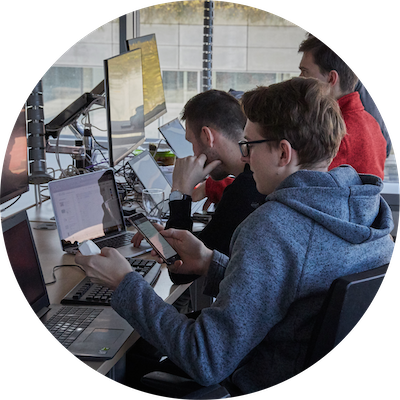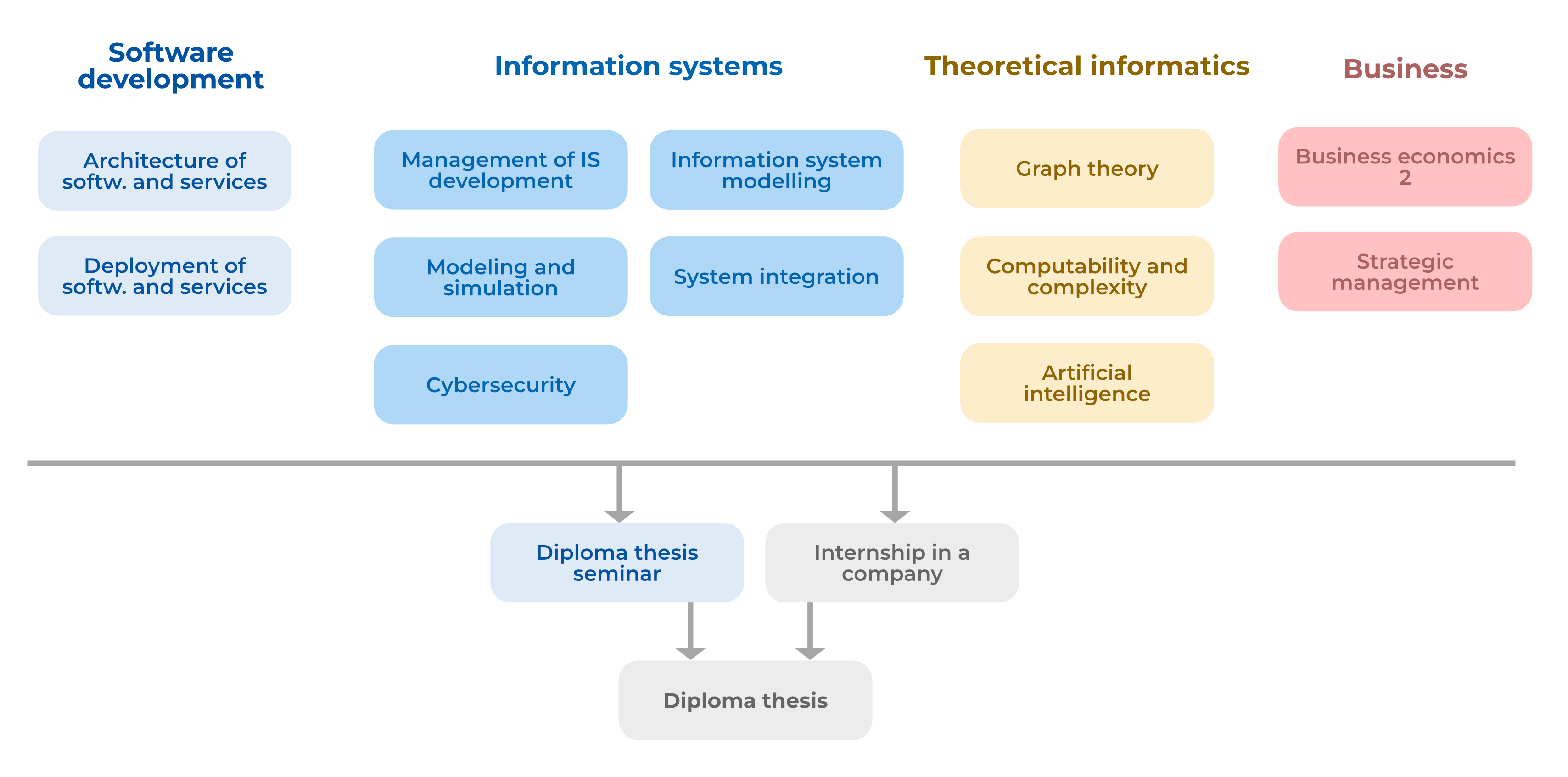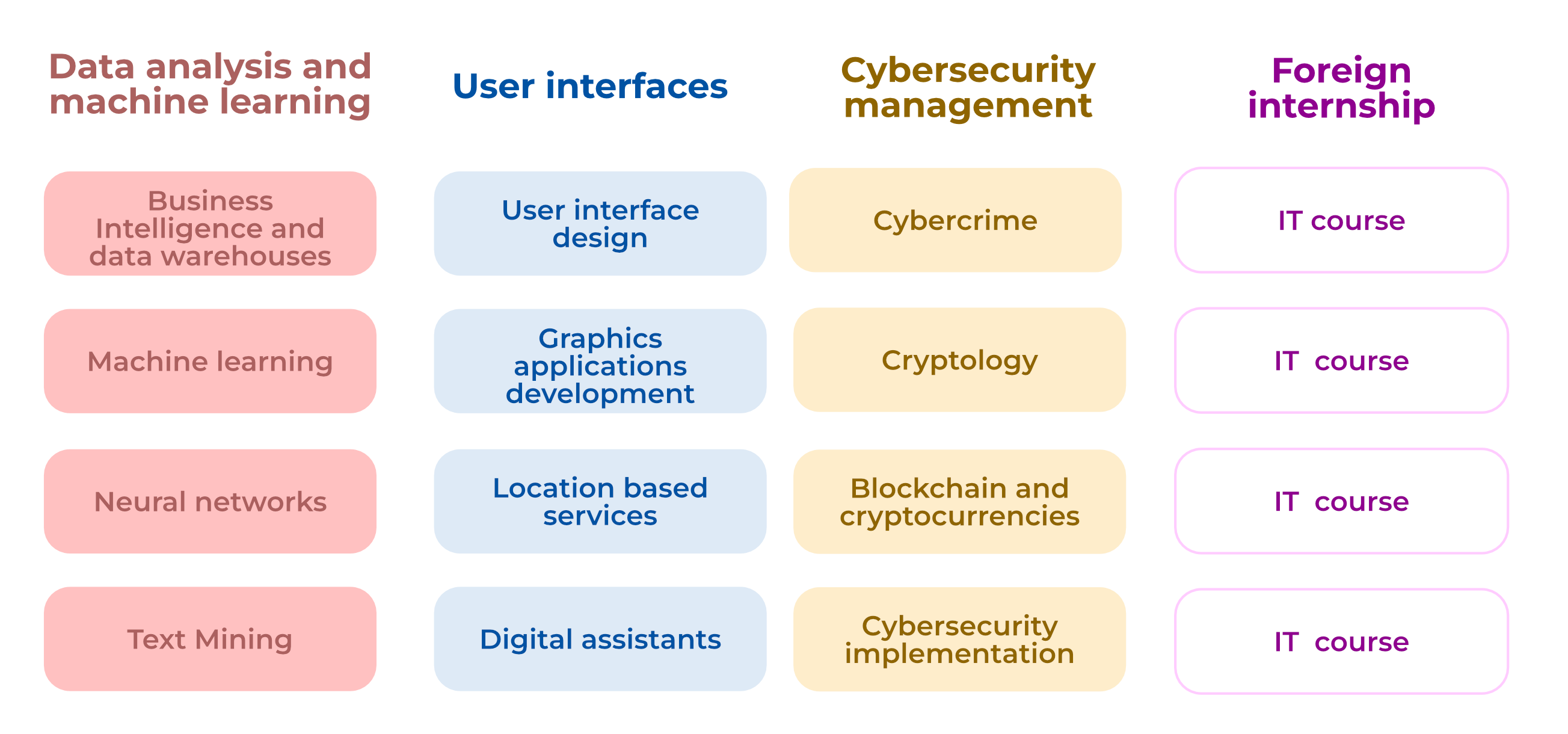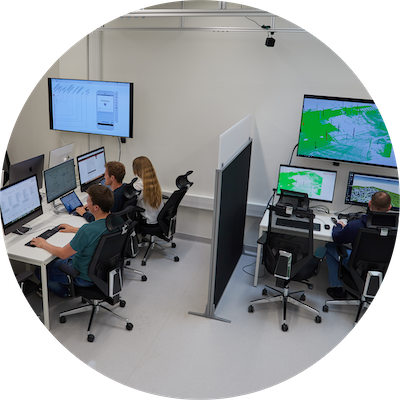Open Informatics
Master's degree program
Create complex systems!
In addition to a general overview, the bachelor’s degree teaches you how to work with the basic technologies used in IT. You have already achieved deeper experience in your chosen fields, so you are able to work in junior positions. It has also prepared you to distribute tasks, use agile development methodologies, present results, etc. The follow-up master’s degree prepares you for senior corporate positions. For positions where the essence is not to perform specific development tasks, but rather to formulate them for others.
Therefore, the follow-up master’s degree is not built on deepening your knowledge of development for web, mobile or embedded devices. The goal is to learn how to work with the technologies that will determine the overall concept of the resulting products. You will delve into the development, deployment and operation of complex technology systems. You will gain experience related to the design of complex algorithms ranging from graph algorithms to artificial intelligence methods and much more. In addition, you’ll develop the skills needed to strategically manage companies or lead large teams. From your first semester, you will choose two areas to focus on your studies and become experts in.

Common basis of study
In the common mandatory courses, you will focus on information systems modelling and related project management. You will therefore expand your knowledge of classical modelling to the area of process management, which is very often used in corporate practice. This is followed by courses focused on architecture design for implementation and deployment of services, especially in cloud environments. We will see the advantages and disadvantages of commonly used architectures and try things like service containerization, automated deployment and much more such as cybersecurity related aspects of development. Algorithms that solve specific problems are also an essential part of complex systems. Whether it’s recommending an appropriate movie or maybe finding an object in an image. The group of courses therefore focuses on various aspects of algorithm design, from the computational complexity of algorithms to the artificial intelligence so widely used today.
Of course, there are also courses in strategic management and business economics, which give you a deeper insight into the company management. These courses can be complemented by a range of other economics and management courses offered by FBE.
As you may notice, there are only a handful of required courses. Therefore, you will determine the content of much of your studies yourself through the concentrations!

Scopes: advanced technologies and areas
You choose two scopes that will determine your studies. The scopes are less about specific technologies and more about the advanced approaches used in product design. We continually update the scopes to reflect the latest developments in IT.
- Data Analysis and Machine Learning: you will experience storing and analyzing structured and unstructured data with an emphasis on using machine learning methods. You will also focus on processing textual data using natural language analysis methods that you may be familiar with, for example, from the ChatGPT project.
- User interface design: you will learn how to create user interfaces using modern technologies, but also products themselves. Of course, you will not only cover traditional mobile and web applications, but also augmented and virtual reality, voice assistants and other modern interfaces.
- Cybersecurity management: You will focus on various aspects of cybercrime and cyber security using modern technologies, including the necessary theoretical background.
- Study Abroad: as with the undergraduate degree, you can choose to study abroad. You will choose the subjects according to your interest and will be recognised.
Not all scopes are open every year.

Professional internship
As with the Bachelor’s degree, you must complete a professional internship in your chosen company during your studies. Studying in this way allows you to gain experience in the real-life application of your knowledge and skills. Since the internship must be related to the subjects of the recommended curriculum, it increases your competitiveness in the job market. Once you have completed your internship, you can put this experience on your CV. With a little luck, you can also find your future employment through professional practice. You choose the company where you want to do your apprenticeship. Don’t worry, we have an internship for everyone! More details can be found on the apprenticeship website on FBE web pages.
Conditions of admission to study
Dates and conditions of admission, including sample tests and other information, can be found on the faculty’s website.
Why study IT at MENDELU?
You may be wondering whether to study IT at MENDELU or anywhere else. It depends on what you expect from your studies. Studying IT at MENDELU has several interesting features that you may like:
We are focused on contact teaching
Most courses at MENDELU are taught on a weekly lecture and tutorial basis. In some courses it is once every 14 days. This means that we will be intensively dedicated to you. Some schools keep contact teaching to a minimum because it is cheaper. But then you have to study everything yourself or you will lose some of your knowledge.
We prepare management staff
Communication, project management, management fundamentals and other necessary soft skills are across the curriculum. Our graduates are not known for their deep knowledge of assembly or formal languages, but their ability to work as a team and lead is highly valued.
Focused on practice. Really.
Practical study is not just about learning specific technologies and languages in addition to general knowledge. You will have to go on a practical placement as part of your studies. And to prepare you for that internship, we've set the study focus so you can succeed. So no one ends up with an empty CV.
We believe in an individual approach
Around 60 students a year finish their bachelor's studies with us. Approximately one third of these students work on research or development projects at the university during their studies. They make software for ministries, financial institutions or even non-profits. Or they research climate change and its impact on society. Of course, it always depends on your interest.

